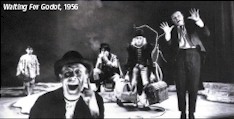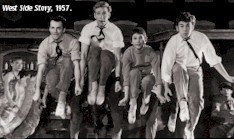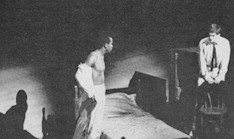 |
|
 |
Intro | First Years | 1919 | 1920's | 1930's | 1940's | 1950's | 1960's | 1970's | 1980's | 1990's 2000-2003 | 2004 | 2005 | 2006 | 2007 | 2008 | 2009 | 2010 | 2011 | 2012 | 2013 |
 |
"Where are these lists? Where are they coming from?" |
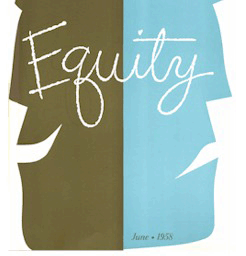 Equity Magazine, June 1958 1950
"A SICKNESS COMMONLY CALLED..."
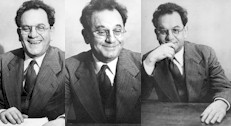 Philip Loeb In 1997, SAG President Richard Masur will say in a ceremony commemorating the 50th anniversary of the Blacklist: "Only our sister union, Actors' Equity Association, had the courage to stand behind its members and help them to continue their creative lives, in the theatre..." Two examples of Equity vs. the Blacklist: In September, 1950, the anti-communist magazine Red Channels accuses prominent Equity officer Philip Loeb of being a communist. Loeb denies the accusation. In 1951, General Foods announces that it will no longer sponsor The Goldbergs, a CBS television series in which Loeb has starred. Several months later, NBC picks up the series - without Loeb. In September of that same year, member John Randolph discovers that his name is on several lists and he cannot work in television. "Where are these lists and where are they coming from?" he asks. On September 28, 1951, Council resolves that blacklisting "is hostile to the fundamental purposes of this Association, and that Actors' Equity will act to the fullest of its capacities in defense of its members." Despite Equity's efforts, Loeb finds only sporadic work over the next several years. On September 1, 1955, he commits suicide. Margaret Webster writes in The New York Times, "He died of a sickness commonly called 'the blacklist.'" Although anti-communist demonstrations appear in front of the theatre where John Randolph was playing in Wooden Dish (1955), thanks to the support of Equity, he is able to keep his job. He will not be able to work in Hollywood or on television for many years, however.
June 25
North Korea invades South Korea. On June 30, President Truman commits American troops to enforce the UN's demand for retreat. The war will end in 1953. October 12
An opening night tradition is born when Bill Bradley, in the chorus of Gentlemen Prefer Blondes, borrows a pink feathered dressing gown and sends it to a friend in Call Me Madam, saying it was worn by all the Ziegfeld beauties and would "bless" the new show. A cabbage rose from Ethel Merman's gown is added and the "Gypsy Robe" gets passed along to the next Broadway musical, inspiring a ritual which continues into the future. November 24
Guys and Dolls opens, with music by Frank Loesser, book by Abe Burrows and Jo Swerling. 1951
This year, the House Un-American Activities Committee will question many theatre luminaries, including Abe Burrows, Josť Ferrer, Gale Sondergaard, Anne Revere and Edward Bromberg of the Group Theatre. Two young college professors in San Francisco, Jules Irving and Herbert Blau, found the Actor's Workshop. A grant from the Ford Foundation will allow them to employ a company of Equity actors in 1960. March 29
Gertrude Lawrence and Yul Brynner star in The King and I, opening at the St. James. 1952
The Equity Committee on the Integration of Negro Performers is formed. April 10
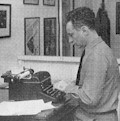 Elia Kazan Elia Kazan appears before HUAC. Criticism over his naming names will haunt his career. May 4
The National in Washington, D.C. finally reopens as a legitimate, and non-segregated, theatre, with Call Me Madam starring Ethel Merman. President Truman is in the sold-out audience. September 17
The Television Authority and AFRA merge into AFTRA. Dwight D. Eisenhower is elected President. |
1953
January 22
Arthur Miller's The Crucible boils tonight for the first time at the Martin Beck. The Off-Broadway Theatre League is founded. Next season, newspapers will begin to list Off-Broadway productions separately. 1954
January
Senator Joseph McCarthy leads the first televised hearings in American history. By the end of the year, the country is disgusted with him, and he will be censured by the Senate. February 23
The Alley Theatre in Houston goes professional with Death of a Salesman starring Albert Dekker. March 10
Off-Broadway gets a shot in the arm as Brecht's The Threepenny Opera comes to the Theatre De Lys (later renamed the Lucille Lortel Theatre) in an adaptation by Marc Blitzstein, starring Lotte Lenya as Jenny. March 28
For an estimated audience of 70 million, every TV network broadcasts "The Rodgers and Hammerstein Cavalcade," starring Mary Martin, Yul Brenner, Tony Martin, and Florence Henderson, among others. May 13
Lots of newcomers at The Pajama Game tonight at the St. James: it's Harold Prince's first show as co-producer, Bob Fosse's as choreographer. And a young dancer named Shirley MacLaine gets a lot of attention when she goes on for the second lead. May 17
Brown v. Board of Education: Supreme Court unanimously declares that segregation in schools is unconstitutional. November
Joseph Papirofsky (later Joe Papp) calls his new troupe the Shakespeare Workshop. It will grow. 1955
January
In his State of the Union Address, President Eisenhower calls for establishment of a Federal Advisory Commission on the Arts. July 12
The American Shakespeare Festival opens in Stratford, Connecticut. August 1
"It seems a little curious to be using the past tense with regard to the Chorus Equity Association," says Equity Magazine. "It has always been such a live and lively organization that the future tense seems to be its proper one." Despite some lingering concerns, Chorus Equity and Actors' Equity merge under the guidance of Chorus Executive Secretary Ben Irving. What a year: in March, Kim Stanley is in Bus Stop at the Music Box, and Ben Gazzara is in Tennessee Williams' Cat on a Hot Tin Roof at the Morosco. In April, the National on Broadway opens Inherit the Wind by Jerome Lawrence and Robert E. Lee, and in May, Damn Yankees by Richard Adler and Jerry Ross opens at the 46th Street Theatre. "Before the evening was over, both sides were crying as if their hearts would break, and the Yugoslav people said it was the saddest happiest time they had had in years." - New York Herald Tribune correspondent Art Buchwald on production of Porgy and Bess, touring Europe and parts of the USSR with assistance from the State Department. December 1
43 year old seamstress Rosa Parks will not give up her seat to a white man on a bus in Montgomery, Alabama. The following night, 50 leaders of the black community, including Martin Luther King, Jr. begin to organize the Montgomery Bus Boycott. 1956
Last year, Equity Council declared that Industrial Shows are under Equity jurisdiction. Now, after nine months of negotiation, AEA reaches an agreement with the producers of Industrial Shows covering wages and working conditions. January 13
Equity moves to its new headquarters at 226 West 47th Street. March 15
My Fair Lady at the Mark Hellinger, starring Rex Harrison and Julie Andrews. March 19
Equity Council adopts a resolution requiring producers to get written permission from AEA when employing any alien actor. In October, Robert Whitehead suggests that AEA's Alien Policy is un-American. "It is not our heritage," he writes in The New York Times, "to close our shores to those with something to add to our shaping culture. Xenophobia, on us, does not look good." Equity Council replies, "Actors' Equity is the sole union which, at the expense of its own membership, makes...generous concessions...in the interest of international cultural exchange." April 19
Dial M for "Missing the Point" : "No story and no action," says Variety of the American premiere of Samuel Beckett's Waiting for Godot starring E.G. Marshall and Bert Lahr.
|
June 22
Arthur Miller testifies before HUAC. He will not name names of others who attended communist front organizations. In 1957, he will be indicted for contempt of Congress, fined $500 and given a month's suspended sentence. November 7
O'Neill's Long Day's Journey Into Night opens at the Helen Hayes. In Alabama, the Montgomery Bus Boycott begins. The Supreme Court will later rule that bus segregation is illegal. Eisenhower is reelected President. 1957
Equity resolves not to play theatres in South Africa while apartheid exists. Joseph Papp parks his mobile theatre in Central Park and invites audiences to see Shakespeare for free. September 25
Nine black students are escorted to a high school in Little Rock, Arkansas by the 101st Airborne Division. President Eisenhower has dispatched the troops to enforce desegregation. September 26
West Side Story opens at the Winter Garden.
December 19
The Music Man by Meredith Willson opening tonight at the Majestic stars Robert Preston. Stop the presses! Equity Magazine headline: "Equity to Disband in 1961." The writer is using this shocking headline in Equity Magazine to draw attention to the growing "right-to-work" legislation throughout the country. "Right-to-work" ostensibly means that employees decide for themselves whether or not to join a union; the writer calls it "right-to-starve." 1958
Despite the fact that "George Cohan and Equity had their differences," Max Gordon asks Equity for a donation for the proposed memorial to Cohan in Times Square. AEA Executive Director Angus Duncan replies: "George Cohan and Equity did have their 'differences'...He never accepted Equity and fought it all his life...." Nevertheless, Equity Council agrees to make a token contribution to the project: $240, equal to the cost of a lifetime membership in the union. Oscar Hammerstein II writes back, suggesting that the amount "carries with it an ironical suggestion that a few stray grains of bitterness remain...I do not dispute your right to continue a resentment so deep. I must, however, refuse to cooperate with you in pin-pricking George's ghost." The $240 is returned. 1959
March 11
A Raisin in the Sun by Lorraine Hansberry opens on Broadway, directed by Lloyd Richards. Sidney Poitier stars. April 20
On the stage of Broadway's Majestic Theatre, Equity sponsors the first Integration Showcase for an audience of casting directors and producers: a selection of famous scenes using what is later to be known as non-traditional casting.
May
Equity strongly protests Parks Commissioner Robert Moses' denial of Central Park to Joseph Papp's New York Shakespeare Festival. The New York State Court of Appeals will later rule that Moses was "unreasonable." As Equity Magazine writes, "All by himself, the controversial Mr. Moses added another battle star to his one-man campaign to infuriate the populace." June
Bill Pullinsi and Tony DeAngelo found the first "dinner playhouse" in the United States: the Presidential Arms in Washington D.C. Pullinsi goes on to found the Candlelight Dinner Theatre and the Forum in Chicago. September 11
The statue of George M. Cohan on Times Square by Georg John Lober is unveiled. November 16
The Sound of Music opens at the Lunt-Fontanne starring Mary Martin and Theodore Bikel. This will be Rodgers & Hammerstein's last collaboration. December 16
The Second City opens in Chicago, and just in time; the coming decade will prove fertile ground for its explosive social and political satire. Alumni will include Harold Ramis, John Belushi, Bill Murray, Dan Aykroyd, Gilda Radner, Tina Fey, and countless others. Second City will branch out to Detroit (1991), Las Vegas (2001), and Cleveland (2002).
|
||
| to timeline introduction... | ||||
